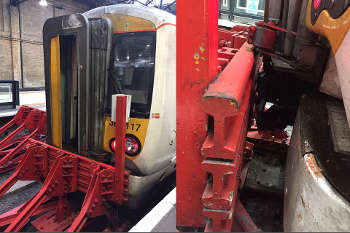The driver of a train that hit buffers at King’s Cross station had experienced a microsleep shortly beforehand, rail investigators have concluded, prompting further warnings over the importance of effective fatigue risk management.
The Rail Accident Investigation Branch (RAIB) has published a ‘safety digest’ report into the incident that occurred at around 06:23 hrs on 15 August 2017 when a four-carriage Great Northern service collided with buffer stops.

Picture courtesy of Network Rail
The report states that the crash ‘occurred because the driver was suffering from fatigue and apparently experienced a microsleep in the last few seconds of the approach’.
Investigators said that on approach to the platform the train passed a Train Protection and Warning System sensor at an appropriate speed but that the driver ‘then briefly closed her eyes because they felt tired and were stinging.
‘When she opened them, she was close to the buffer stops and, although she made an emergency brake application, it was too late to avoid a collision.’
Four passengers and one member of staff reported minor injuries and there was minor damage to the train and the buffer stops, which were pushed back by over one metre.
The RAIB said the accident ‘demonstrates the importance of effective and comprehensive fatigue risk management on the part of both individuals and organisations, including not just controls on working hours but also suitably timed breaks, preparation for duty and the appropriate use of mitigations’.
The report discloses that the driver’s shift had exceeded Rail Safety and Standards Board (RSSB) guidance on managing fatigue, in terms both of the overall length of the shift and the time she went without a break.
It also discloses that Great Northern’s procedure to manage the risks of fatigue is dated October 2010, ‘and has not been updated in the light of comprehensive guidance on fatigue risk management published by both the Office of Rail and Road (ORR) and RSSB in 2012’.
However, it adds that last year Great Northern’s parent company, Govia Thameslink Railway (GTR) issued guidance for staff on both fatigue awareness and controlling fatigue specifically associated with first night shifts and that drivers are required to demonstrate knowledge of fatigue management during two-yearly competence assessments.
A GTR spokesperson said: ‘We take fatigue issues very seriously and strive continuously to improve in this area in line with industry good practice. Our internal investigation of this incident has not concluded, so we are not able to comment on the details.’
The RAIB is currently concluding its investigation into the Croydon tram crash last November, in which seven people died and which also occurred in the early morning. It believes that the driver could have ‘lost awareness’ as the tram approached a bend.
Questions have been raised about how tram operator First Group responded to concerns reported two years before the crash that shift patterns were leading to fatigue among drivers.
The office of London Assembly Member Caroline Pidgeon told Transport Network that London mayor Sadiq Khan has failed to respond to two questions she tabled on the issue, which were due for response on 16 October.
At the time of publication, the Greater London Assembly website states in each case: 'Officers are drafting a response which will be sent shortly.'
Register now for full access
Register just once to get unrestricted, real-time coverage of the issues and challenges facing UK transport and highways engineers.
Full website content includes the latest news, exclusive commentary from leading industry figures and detailed topical analysis of the highways, transportation, environment and place-shaping sectors.
Use the link below to register your details for full, free access.
Already a registered? Login